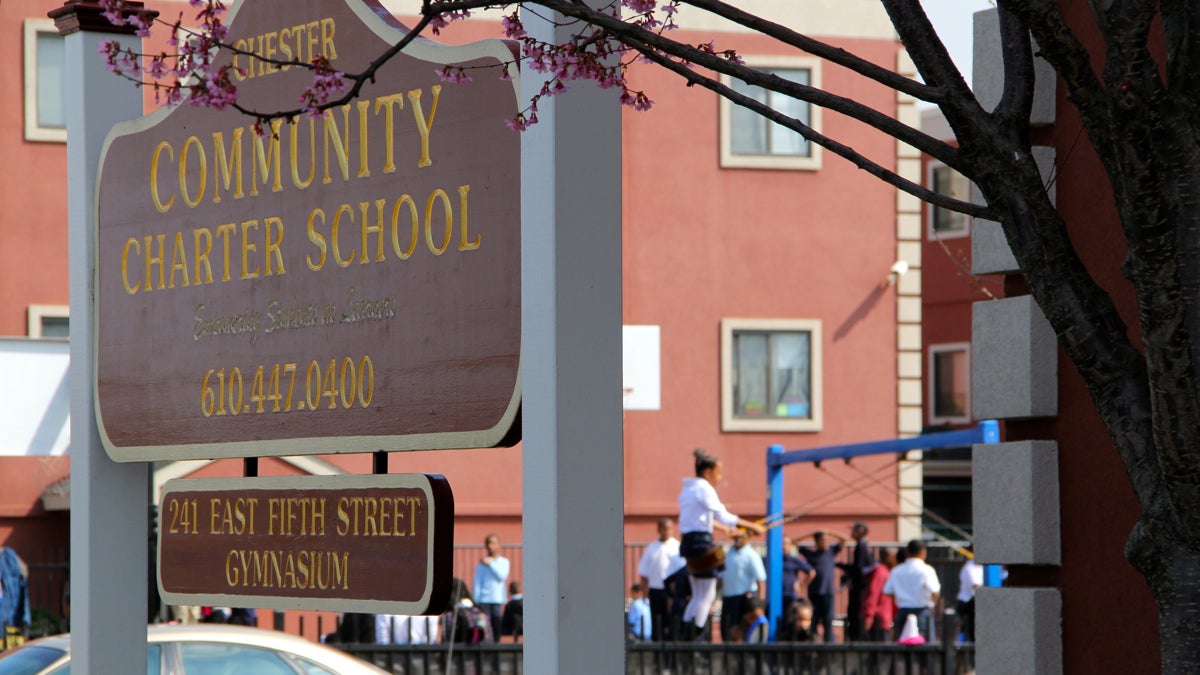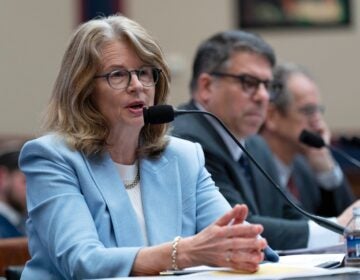Chester schools to seek special funding from Pa., cut charter fees

Chester Community Charter School. (Emma Lee/WHYY)
In the midst of hearings to determine the fate of Chester Upland, arguably Pennsylvania’s most financially distressed school district, representatives held private negotiations on cutting charter school payments.
In the midst of hearings to determine the fate of Chester Upland, arguably Pennsylvania’s most financially distressed school district, representatives from the state and local charter schools held private negotiations on cutting charter school payments.
The fruits of those dealings are a compromise and a new financial recovery plan.
In the 145-page document, the three largest charter schools serving the district — Chester Community Charter School, Chester Charter School for the Arts and Widener Partnership Charter School — agreed to a reduction in payments for special-education students, from $40,000 per student to $27,028.72 per student. That fee change would be locked in for the next 10 years.
The state had been seeking a reduction to $16,000 per student, the amount recommended by a bipartisan special education funding commission, in order to save Chester Upland around $22 million a year.
The document, called a financial recovery plan, laid out a comprehensive proposal for pulling Chester Upland back from its $24.4 million deficit and returning it to financial solvency.
In addition to the reduction in fees, the three charters have agreed to waive the state’s unpaid bills from the previous school year, reducing the deficit by $8.6 million.
And Gov. Tom Wolf’s administration has promised a permanent increase to the state’s contribution to the Chester Upland School District, as well as a means to erase the remaining fund deficit.
First, the debt. State Rep. Thaddeus Kirkland, D-Delaware, has introduced House Bill 1521, calling for a one-time infusion of cash to help erase the district’s debts. Failing that, the state has committed to restructuring Chester Upland’s debt load with an as-yet unnamed financial institution to reduce yearly payment.
Debt is only half the story. Chester Upland also struggles to maintain even the reserves necessary to make payroll on a year-to-year basis. As a part of the financial recovery plan, the Wolf administration committed to seeking funds from the Legislature to increase the state’s regular payments to the district, from the to-be-determined state budget.
“Look, if they can do it, this will provide the financial stability the district needs,” said Michael Churchill, lawyer and advocate with the Public Interest Law Center.
The “if” is whether the governor can promise more funds in the midst of ongoing budget battles with state Republican leaders.
Jeff Sheridan, spokesman for Wolf, said without a state budget the administration can’t put a number on how much more it will ask for.
In hearings on previous financial recovery plans, Judge Chad Kenney repeatedly railed against plans that only reduced charter school payments, and said that the state must own up to chronically underfunding Chester Upland.
While Chester Upland may be in the most dire fiscal straits, other districts are on its path. Philadelphia, York and Duquesne also have some form of state involvement in school administration.
In each of these cases, local contributions — which generally make up the majority of school funds — can’t cover the needs of the district. These districts, in particular Philadelphia and Chester Upland, also send out millions to charters. Those charters educate large proportions of students but are not subject to the same oversight as public schools and their funding level is set by the Legislature.
In times of budget scarcity, that can force districts to choose between paying their charter bills or keeping their doors open.
In the press statement for the new recovery plan, Wolf’s team thanked an unlikely ally for help striking the deal with charters.
“Vahan Gureghian is who led the effort to find an agreement on the charter school side,” said Wolf spokesman Jeff Sheridan. Gureghian is the CEO of CSMI, the private company that manages Chester Community Charter School, and a big-time Republican donor.
“The politics of this [deal] need further investigation,” said Churchill.
Kenney will hear arguments on the new recovery plan Tuesday. The state is asking Kenney to force the charter school tuition payment change on all charters serving Chester Upland, not just the three that helped draft the agreement.
WHYY is your source for fact-based, in-depth journalism and information. As a nonprofit organization, we rely on financial support from readers like you. Please give today.




